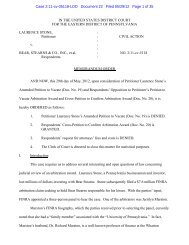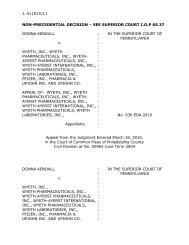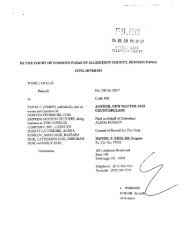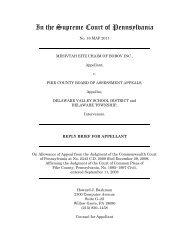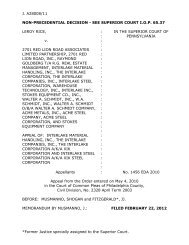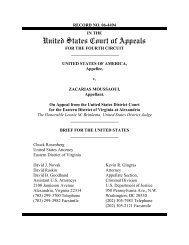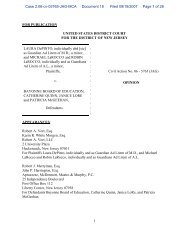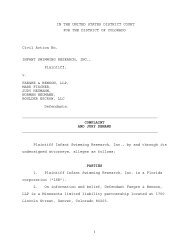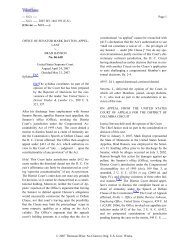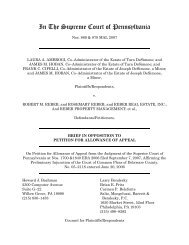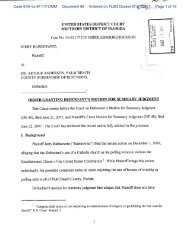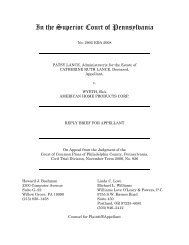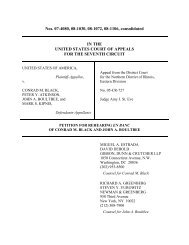In the Superior Court of Pennsylvania - How Appealing
In the Superior Court of Pennsylvania - How Appealing
In the Superior Court of Pennsylvania - How Appealing
Create successful ePaper yourself
Turn your PDF publications into a flip-book with our unique Google optimized e-Paper software.
And, although “<strong>the</strong>re are [very] few facts which reasonable diligence cannot<br />
discover, <strong>the</strong>re must be some reason to awaken inquiry and direct diligence in <strong>the</strong><br />
channel in which it would be successful.” Id. (internal quotations omitted; emphasis<br />
added). Importantly, Fine was clear about <strong>the</strong> subjective aspects <strong>of</strong> <strong>Pennsylvania</strong>’s<br />
standard:<br />
Put ano<strong>the</strong>r way, “<strong>the</strong> question in any given case is not, what did <strong>the</strong><br />
plaintiff know <strong>of</strong> <strong>the</strong> injury done him? But, what might he have known,<br />
by <strong>the</strong> use <strong>of</strong> <strong>the</strong> means <strong>of</strong> information within his reach, with <strong>the</strong><br />
vigilance <strong>the</strong> law requires <strong>of</strong> him?” While reasonable diligence is an<br />
objective test, “‘it is sufficiently flexible * * * to take into account <strong>the</strong><br />
differences between persons and <strong>the</strong>ir capacity to meet certain situations<br />
and <strong>the</strong> circumstances confronting <strong>the</strong>m at <strong>the</strong> time in question.’” Under<br />
this test, a party’s actions are evaluated to determine whe<strong>the</strong>r he<br />
exhibited “‘those qualities <strong>of</strong> attention, knowledge, intelligence and<br />
judgment which society requires <strong>of</strong> its members for <strong>the</strong> protection <strong>of</strong><br />
<strong>the</strong>ir own interest and <strong>the</strong> interest <strong>of</strong> o<strong>the</strong>rs.’”<br />
Id. (internal citations omitted; emphasis added).<br />
Fine teaches that <strong>Pennsylvania</strong>’s discovery rule is not anchored to what <strong>the</strong><br />
defendant could reasonably know. Nor is it anchored to what <strong>the</strong> trained medical<br />
community could reasonably know. Ra<strong>the</strong>r, <strong>Pennsylvania</strong>’s “flexible” standard asks<br />
whe<strong>the</strong>r <strong>the</strong> plaintiff was reasonably diligent in searching out <strong>the</strong> cause <strong>of</strong> her<br />
injury by <strong>the</strong> use <strong>of</strong> “<strong>the</strong> means <strong>of</strong> information within [her] reach” and in view <strong>of</strong><br />
“[her] capacity to meet certain situations and <strong>the</strong> circumstances confronting [her] at<br />
<strong>the</strong> time in question.” Id. And Fine makes clear that this question is for <strong>the</strong> jury.<br />
The facts <strong>of</strong> <strong>the</strong>se 14 consolidated appeals are even more compelling in favor<br />
<strong>of</strong> applying <strong>the</strong> discovery rule than were <strong>the</strong> facts <strong>of</strong> Fine and Wilson, in which this<br />
<strong>Court</strong> held that a jury could apply <strong>the</strong> discovery rule to find that plaintiffs’ claims<br />
– 26 –



